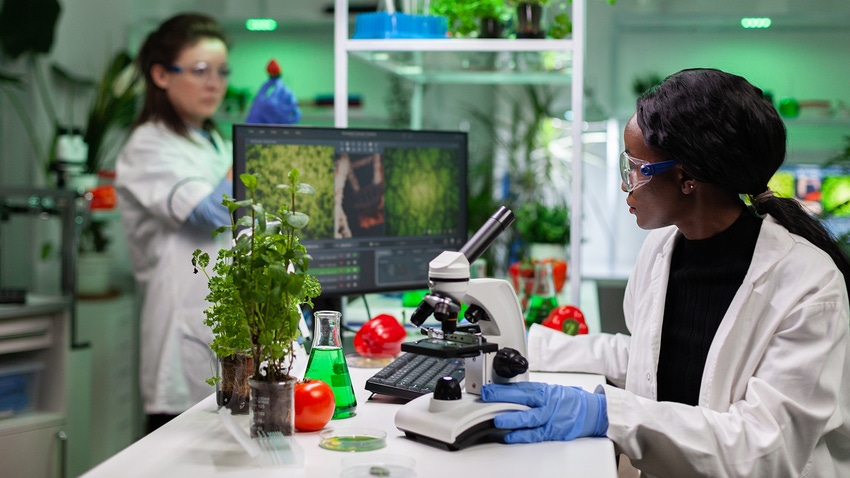Business Bites: Ahara’s new DEI solution transforms food-is-medicine initiative for BIPOC communities
On this week’s plate: Ahara Corp. branches out from “Euro-centric foods,” offers personalized nutrition to underrepresented communities; CES 2024 features food and beverage tech; new research shows vegetarians may be unhappy with plant-based products; and more.

At a Glance
- Ahara Corp. now offers personalized and culturally relevant nutrition solutions to BIPOC communities.
- With more than 4,000 exhibitors, CES 2024 showcased an array of innovative food technologies.
- New research suggests that the food satisfaction rate is only 8% among vegetarians, but 17% among vegans.
A new diversity, equity and inclusion (DEI) solution at Ahara Corp. aims to improve food and nutrition options for BIPOC communities. Also, the Consumer Electronic Show (CES) 2024 introduced new food tech to an audience of more than 100,000 attendees, and new research suggests that vegetarians are unhappy with available food products, while vegans are happier than ever. Both might be thanks to the broadening market for plant-based foods. Learn more in this week’s column.
Ahara brings culturally tailored food programs to food-is-medicine initiative
To kick off 2024, health tech company Ahara Corp. introduced a DEI solution for the food-is-medicine initiative. The movement is growing rapidly in response to food insecurity and diet-related conditions, which disproportionately affect BIPOC communities. Despite evidence that shows food and nutrition are powerful solutions to chronic conditions that affect these communities, one “critical factor is missing in the food-is-medicine movement,” according to Ahara. That’s cultural relevancy — until now. Ahara said most solutions in the movement tend to reflect “Euro-centric foods,” which prompted the personalized nutrition company to develop a diverse range of culturally relevant food solutions targeted to BIPOC communities. Ahara now provides a variety of food and nutrition solutions, led by nutrition experts and registered dietitians from a variety of backgrounds and languages, to ensure solutions “reflect the foodways of the populations that need them the most.”
CES 2024 brings the food tech with algae, electronic noses, more
This year’s International CES, held Jan. 9-12 in Las Vegas, put a special emphasis on food technology—specifically, how technological innovations are driving a global paradigm shift in the ways food is produced, packaged and delivered. Hosted by Consumer Technology Association (CTA), the event projected 130,000 attendees this year, with more than 4,000 exhibitors and 1,200 startups. Among these were food-focused companies such as Algal Bio, an algae bio-foundry platform; Ajinomatrix, which specializes in sensory technology such as electronic noses for food testing; and Compocity, a food waste tracking platform for businesses.
“Compocity is a real on-site, small-scale, industrial solution to turn communities’ food waste into soil food with a playful composting chef called CompoBot and an impact-tracking app that revolutionizes how climate tech becomes a community-building employer branding tool,” Emese Pancsa, founder and CEO of Compocity, said. She added that EU clients helped Compocity attend CES 2024 to gain feedback on its value proposition and prepare for a future U.S. service launch.
New research suggests vegetarians unsatisfied with plant-based foods
An online poll by Ingredient Communications found that U.S.- and U.K.-based vegetarians are less satisfied than ever with the standard food products on the market but may be nearly as unsatisfied with plant-based foods. The net satisfaction rate for standard foods was only 8% among 1,000 vegetarian respondents, a significant drop from 47% in 2018. Satisfaction among vegans, however, more than quadrupled from 2% to 17%.
“I would say that the food industry has a tendency to lump vegans and vegetarians together,” Richard Clarke, managing director of Ingredient Communications, said. “Vegetarians are happy to eat dairy cheese, butter, cream and eggs. By removing these ingredients from meat-free products and adding alternatives, it’s possible that some vegetarians find the end product less appealing. There are four times more vegetarians than vegans in the U.S., so it’s commercially important that brands and retailers ensure the needs of vegetarians are at least as well served as those of vegans.”
New indoor vertical farming facility opens in New York state
The east side of Buffalo, New York, has been seeing some multimillion-dollar advancements over the last few years. The most recent: a new indoor food production facility primed to advance urban farming. Located within a 40-foot shipping container at the Buffalo Go Green’s Zenner Street urban farm, the indoor vertical farming facility will grow vegetables and herbs year-round without the use of soil. Community members, with oversight and direction from Buffalo Go Green, will produce and distribute the produce to underserved communities. Buffalo Go Green, which provides programming and training to underserved communities in Western New York, will oversee community training on the farm, teaching hydroponic gardening, sustainability and nutrition.
“We remain committed to addressing food insecurity in East Buffalo and ensuring that the community has access to affordable and healthy food options, including fresh fruits and vegetables,” Gov. Kathy Hochul said. “I applaud the New York Power Authority, EPRI, Buffalo Go Green and our local partners for making this shipping container and farming programming available to our East Buffalo community to increase access to healthy foods.”
Naturally Network releases 2023 Impact Report
Naturally Network recently released its 2023 Impact Report, showcasing its connections and influence within the natural and organic products industries. The report spotlights successes in three key areas: enhancing chapter success, providing access to market and cultivating future industry leaders. According to Katrina Tolentino, executive director at Naturally Network, ensuring success in each area meant giving every chapter what it needed to be effective, boosting new brands alongside existing ones, and empowering leaders with access to expert guidance and education.
“What’s incredible about our impact is that it’s driven by the needs of our community and is supported by key industry leaders and organizations,” Tolentino wrote in the report. “With 38,000+ industry participants and 31% growth this year, our community reflects the innovation taking place in the natural products industry.”
Nutiani unveils Top 10 Health and Nutrition Trends for 2024
Nutiani, a B2B wellbeing nutrition brand, released its Top 10 Health and Nutrition Trends for 2024, based on its Ipsos Consumer Health and Nutrition Index 2023. The research, conducted with 2,500 consumers across five global markets in June 2023, indicates that consumers are prioritizing high-quality, science-backed and multifunctional nutrition solutions in response to the rising costs of living. The top three trends for 2024 include the search for value amid inflation, with consumers emphasizing high-quality products that offer good value; scientific credibility, as consumers trust scientifically proven ingredients and certifications by reputable sources; and mental well-being, with consumers considering it a crucial aspect of overall health. Sleep quality is highlighted as a top health concern, reflecting the growing importance of addressing mental health issues. Despite inflationary pressures, consumers remain committed to improving health through their diets, showcasing a shift towards discerning choices for quality products. Nutiani plans to release a detailed report in the first half of 2024, delving further into shifting consumer behaviors and preferences in the context of inflation to aid brands in innovation.
About the Author(s)
You May Also Like








